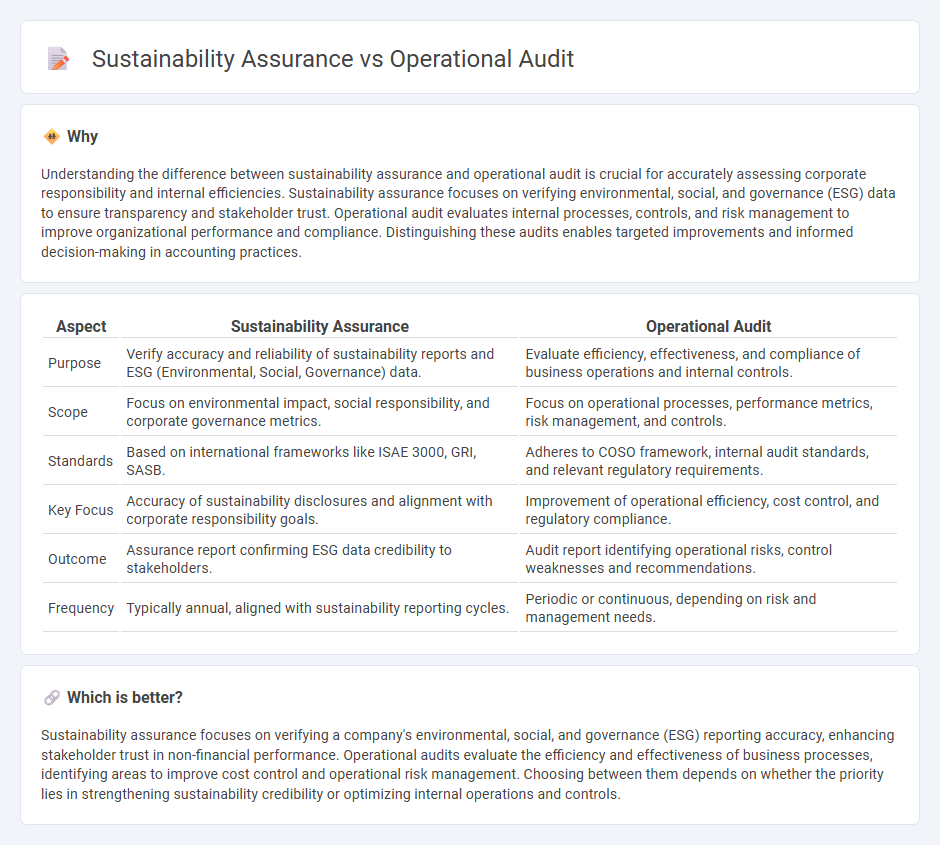
Sustainability assurance evaluates a company's adherence to environmental, social, and governance (ESG) criteria, ensuring transparency and credibility in sustainability reporting. Operational audit focuses on assessing the efficiency and effectiveness of business processes, identifying potential improvements to optimize organizational performance. Explore how these auditing approaches complement each other to enhance corporate accountability and resilience.
Why it is important
Understanding the difference between sustainability assurance and operational audit is crucial for accurately assessing corporate responsibility and internal efficiencies. Sustainability assurance focuses on verifying environmental, social, and governance (ESG) data to ensure transparency and stakeholder trust. Operational audit evaluates internal processes, controls, and risk management to improve organizational performance and compliance. Distinguishing these audits enables targeted improvements and informed decision-making in accounting practices.
Comparison Table
| Aspect | Sustainability Assurance | Operational Audit |
|---|---|---|
| Purpose | Verify accuracy and reliability of sustainability reports and ESG (Environmental, Social, Governance) data. | Evaluate efficiency, effectiveness, and compliance of business operations and internal controls. |
| Scope | Focus on environmental impact, social responsibility, and corporate governance metrics. | Focus on operational processes, performance metrics, risk management, and controls. |
| Standards | Based on international frameworks like ISAE 3000, GRI, SASB. | Adheres to COSO framework, internal audit standards, and relevant regulatory requirements. |
| Key Focus | Accuracy of sustainability disclosures and alignment with corporate responsibility goals. | Improvement of operational efficiency, cost control, and regulatory compliance. |
| Outcome | Assurance report confirming ESG data credibility to stakeholders. | Audit report identifying operational risks, control weaknesses and recommendations. |
| Frequency | Typically annual, aligned with sustainability reporting cycles. | Periodic or continuous, depending on risk and management needs. |
Which is better?
Sustainability assurance focuses on verifying a company's environmental, social, and governance (ESG) reporting accuracy, enhancing stakeholder trust in non-financial performance. Operational audits evaluate the efficiency and effectiveness of business processes, identifying areas to improve cost control and operational risk management. Choosing between them depends on whether the priority lies in strengthening sustainability credibility or optimizing internal operations and controls.
Connection
Sustainability assurance and operational audit intersect through their focus on evaluating organizational processes and controls to ensure compliance with environmental and social standards while optimizing operational efficiency. Both practices utilize systematic assessment frameworks, risk management techniques, and internal control evaluations to identify improvements that support sustainable business performance. Integrating sustainability assurance within operational audits enhances transparency, accountability, and long-term value creation in corporate reporting and governance.
Key Terms
**Operational Audit:**
Operational audit evaluates the efficiency, effectiveness, and compliance of business processes to improve overall organizational performance. It assesses internal controls, risk management, and resource utilization, ensuring operational goals align with strategic objectives. Explore more to understand how operational audits drive operational excellence and informed decision-making.
Efficiency
Operational audits evaluate internal processes, controls, and efficiency to enhance organizational performance and minimize risks. Sustainability assurance examines environmental, social, and governance (ESG) practices, ensuring accuracy and transparency in sustainability reporting to meet stakeholder expectations. Explore deeper insights into operational audit and sustainability assurance to optimize both efficiency and sustainability goals.
Internal Controls
Operational audit evaluates internal controls to ensure efficiency, compliance, and risk management within organizational processes, emphasizing financial accuracy and operational effectiveness. Sustainability assurance assesses internal controls related to environmental, social, and governance (ESG) practices, verifying the credibility and transparency of sustainability reporting. Explore deeper insights into how both audits strengthen internal controls and drive organizational integrity.
Source and External Links
Operational Audit: Overview and Guide - AuditBoard - This resource provides an overview of operational audits, which are used to optimize internal processes and enhance efficiency in businesses.
Guide To Operational Auditing: Definition, Process, Advantages and ... - This guide explains the operational auditing process, its advantages, and the steps involved in conducting such audits.
Operational auditing - Wikipedia - This Wikipedia article defines operational auditing as a systematic review of an organization's effectiveness, efficiency, and economy of operations.
 dowidth.com
dowidth.com